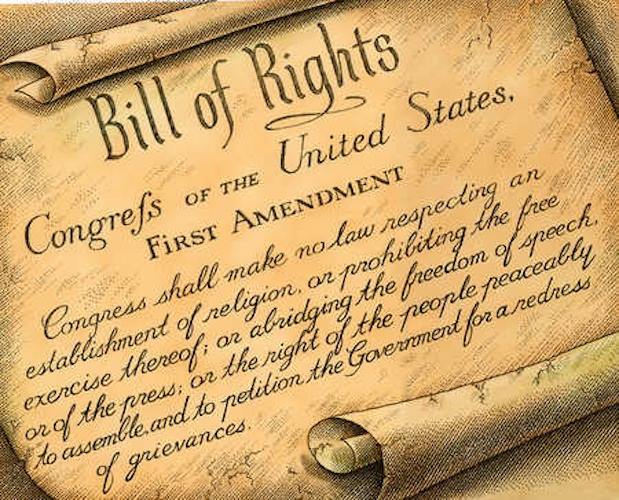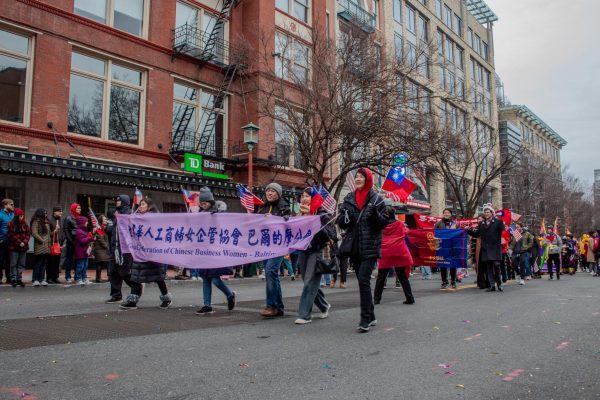Freedom of Speech, Explained: Why the Discourse on Religious Freedom Goes Nowhere
As we watch presidential candidate Mike Huckabee use scary terms like “criminalization of Christianity” in supporting Kentucky clerk Kim Davis, the need for a ninth-grade civics class becomes increasingly apparent. Within the ongoing conversation of religious freedom, the American public could use a refresher over what the First Amendment actually protects.
Stated directly in the Bill of Rights::
Congress shall make no law respecting an establishment of religion, or prohibiting the free exercise thereof; or abridging the freedom of speech, or of the press; or the right of the people peaceably to assemble, and to petition the government for a redress of grievances.
To Huckabee, this means that Kim Davis is well within her Constitutional rights to act in the name of her religious beliefs. To stop her would be to prohibit her freedom of speech. Her actions in refusing to issue marriage licenses to same-sex couples are “courageous” and “bold”, fighting for the right to express and demonstrate Christian values.
But does “freedom of speech” actually protect Kim Davis in the way “religious freedom activists” claim it does? Over the course of U.S. history, we have had to define what exactly “freedom of speech” protects in the 21st century. That’s where the Supreme Court comes in. Case law provides guidance for the Court when U.S. citizens are faced with situations beyond the wildest dreams of some influential white men who lived three hundred years ago. Despite what Huckabee believes, this is not tyranny: this is literally part of the Court’s job. The judicial system can indeed affect legislation by interpreting and translating its language for us.
The Founding Fathers believed in the “marketplace of ideas” where “the competition of widely varying ideas freely shared in public discourse” was the surest path to liberal democracy. The hope is that bad ideas are sunk by the public’s disapproval, and good ideas are buoyed by the public’s support — either way, it’s the public’s right to decide. Disagreement is natural and encouraged by democracy’s “marketplace of ideas”; the point that Huckabee misses is that freedom of speech protects both the sayers and the naysayers. The right to voice your thoughts does not absolve you from social consequences, nor does it protect you from criticism.
So then what kind of expression of ideas fall outside of these boundaries? Are there even such ideas that are beyond the worth of discussing?
History has answered: yes. Things like child pornography, “fighting words”, terrorist threats, and false advertising are pretty obvious why they’re not worth considering. When it comes to the speech of government employees (such as Kim Davis), things aren’t as clear. Where is the line between dissent that can be protected and disruptions that exist solely as harassment?
Typically, free speech in private companies is not protection from termination due to initial contracts drawn at employment. If you violate the terms set by a private company, the government usually cannot help you. However, when your employer is the government itself, you have slightly more protection, but only on the grounds of “public concern.” If your interest to express yourself in matters of public concern is greater than the government’s interest in actually running this country, then you may actually have a case for yourself.
Unfortunately, the definition of what constitutes as “public concern” gets a little murky. So far, the list of included subjects has been added to on a case-by-case basis. Generally, the idea is that employee expression is of public concern when it relates to “political, social, or other concern to the community.”
The U.S. Supreme Court case of Garcetti v. Ceballos offers further clarity. Garcetti v. Ceballos decided that First Amendment protection only protects government employees when they are acting or speaking as private citizens (i.e. on their own time, not on the job) and speaking in a public forum for such expression. When you act or speak in the role of a government employee, you do not speak for yourself—you are representing your employer, namely, the government. So, if for example, you are a Kentucky county clerk and you blatantly refuse to carry out your official duties, such as (hypothetically speaking) issue marriage licenses to same-sex couples, and then go as far as preventing your entire county office from issuing valid marriage licenses, then you are point-blank disrupting the local government from doing its job.
You can no longer cite the First Amendment as a justification, because you are literally infringing on the rights of others.
Notice, however, my complete lack of mentioning religion. What a Kentucky county clerk did (or failed to do) was unacceptable on the most basic legal and Constitutional level. Framing the conversation in this way absolves me from ever having to discuss Kim Davis’s morality. You can see then, how you define this critical, national discussion will heavily determine the answers you find. Your right to free speech includes the right to practice your religion without the government interfering with how you express it. This idea stems from the separation of church and state. Meaning, as an agent of the state, you cannot impose your religious views when someone seeks the governmental service you were sworn to provide.
But at the root of this discussion, we find ourselves coming back to the “moral” protest against same-sex marriage over and over again. And in this pattern found in countless news articles and Facebook arguments, we forget to ask: are we even having the right conversation?
We can argue about constitutional rights all we want, but these are just means to an end—until we can speak about both the root of our demands and the means to them in the same discussion, we will continue to run in circles.
We ask for these liberties, but these demands come from very specific motivations. This is not about “religion” in general; this is very specifically about what the Christian religion says about homosexuality. And this religious belief goes much deeper than a moral injustice. The legal arguments, the outrage, the protests – all of it comes from a very out-dated and bigoted view of homosexuality and an unwillingness to respect the agency of other human beings who are different.
The fear, hatred, and refusal of being able to accept change is something we need to directly discuss if we are to confront the immense political, cultural, and economic polarization in our country today. Dancing around in efforts to be “unbiased” are nice sentiments, but become shallow ways to address an uncomfortable reality, an inconvenient truth. If we don’t talk about it, we will never be able to understand the cause of misunderstandings and conflict, and we cannot fix what we do not understand.












